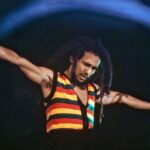The red carpet at last week’s Met Gala featured very few political statements, despite protests over the Gaza war taking place just blocks away. The achievement of this feat surprised a lot of observers, especially since tickets to fashion’s most influential annual spectacle cost $75,000 this year.
However, less than two weeks later, an online protest movement that is rapidly expanding is beginning to take shape. If nothing else, it’s available on TikTok, the social media site that supported the Met Gala.
Referred to as Operation Blockout or Celebrity Block Party, Blockout 2024 is a campaign that targets well-known individuals who, in the opinion of participants, are not using their platforms and profiles to speak out against the Israel-Hamas war and other global humanitarian crises. Here’s what’s happened so far, what supporters want to see happen, and the background to it all.
In what way did it begin? The criticism started on May 6 when influencer Haley Kalil (@haleyybaylee on social media), who hosted an E! News show prior to the event, posted a TikTok video of herself donning a sumptuous floral gown and headpiece reminiscent of the 18th century, accompanied by the sound clip from Sofia Coppola’s 2006 film “Marie Antoinette,” in which Kirsten Dunst exclaims, “Let them eat cake!”.
There were many views of the clip, which Ms. Kalil later apologized for and had removed. Critics referred to it as “tone deaf” in light of the ongoing international conflicts and humanitarian crises.
Posts then started to circulate that made comparisons between the ostentatious costumes celebrities wore on the Met red carpet and scenes from “The Hunger Games,” in which wealthy people dress in luxury and partake in wine and dining while witnessing the suffering of the impoverished districts for entertainment value. Pictures of Palestinian children intercut with images of co-chair of the Met Gala Zendaya provoked the masses on social media. Marie Antoinette’s parroting by Ms.
Kalil served as the catalyst for the creation of the hashtag #ladyfromtheoutside, a TikTok creator. In a video post that received two million views on May 8, she declared, “It’s time for the people to conduct what I want to call a digital guillotine—a ‘digitine,’ if you will.”. “All the influencers, rich socialites, and celebrities who aren’t using their resources to support those in need should be blocked immediately.
We provided them with their platforms. It’s time to take it back, take away our opinions, likes, comments, and financial support. “.
Celebrities on “block lists” who were deemed worthy of being blocked were released and extensively circulated online. What is it that the protesters on social media want? Pro-Palestinian activists have been evaluating A-list celebrities’ words and deeds to determine whether or not they have responded to the conflict appropriately.
People who support Gaza are urged by the movement to block that celebrity on social media if they haven’t said anything or not enough. It’s unclear and varies from celebrity to celebrity what counts as adequate action on the part of the well-known person, whether it’s demands for a cease-fire, donations to support charities, or statements.
Why would you want to block celebrities? Backers of the “blockout” movement contend that blocking is crucial because, before deciding whether to collaborate with influencers or celebrities on product promotion, brands examine information about their following and engagement on social media.
When someone is blocked on social media, their posts are removed from your feed and you regain more control over who can view their own updates and private data. If a user just views a post without liking or sharing it, it can still have a greater effect than unfollowing a celebrity account.
This is because targeted ads and views are important for many product deals. The ability of a content creator to earn money may be impacted if a sufficient number of people block them.
Moreover, proponents of this way of thinking argue, why would you follow someone whose values conflict with your own? Which people are the main targets?
Those with large fan bases, such as Zendaya, Kim Kardashian, and Kylie Jenner, have been the first to go. However, there have also been celebrities, such as Selena Gomez, Taylor Swift, and Justin Bieber, who did not attend the gala this year. Vogue, which has been targeted due to its association with the event, has reportedly published 570 stories about the Met Gala on its platforms and received over a billion video views of the event, according to Puck News.
Elaina Bell, a former employee of Vogue, claimed in a TikTok post that received 850,000 views that “the Met Gala is by far Vogue’s biggest cash cow.”. The way the Met Gala is perceived is crucial to the financial success of both Condé Nast and Vogue, she said, adding that sponsorships were sold “based on the data of past events.”. “. Additionally, was the theme not the subject of some hype?
It certainly made people take notice. “The Garden of Time,” which was inspired by the J., was the dress code. G.
The identically named short story by Ballard. An enormous crowd that is about to overrun and destroy the space harasses an aristocratic couple who are isolated in their fadingly beautiful estate in this allegorical tale.
more like on the nose. Exist any opponents of the movement?
Indeed. The blockout is described in some posts as an example of “cancel culture” gone wrong.
Others contend that it is merely digital posturing that results in minimally significant change, similar to other social media-driven movements. Some contend that public figures have neither the obligation nor the awareness to address complex geopolitical issues, and they also wonder why it really matters what public figures think about these matters. Others believe the movement has blurred boundaries because celebrities like Jennifer Lopez and Billie Eilish, who have previously voiced support for a cease-fire in Gaza, are being penalized for remaining silent at this time.
What then has emerged from it thus far? In their first public videos, a number of celebrities on the widely shared block lists—including Lizzo and influencer Chris Olsen—asked their fans to donate to aid organizations that assist Palestinians.
The Weeknd, Macklemore, and Dua Lipa are just a few of the celebrities that blockout supporters have attempted to “boost” for their recent remarks about the conflict. Many names on block lists have lost tens or hundreds of thousands of followers every day since the “digitine” started, according to metrics from the analytics company Social Blade.
However, it’s unfounded to say that celebrities like Kim Kardashian have lost millions of fans. What takes place at this point? Though it’s too soon to tell, the lists may encourage more A-list celebrities to voice their opinions on the red carpet.
However, the brand aura of the Met Gala is changing significantly for those who use TikTok frequently. While social media-driven boycotts are not new, this most recent movement demonstrates the growing ability of creators to weaponize or redistribute platforms that are essential to the current celebrity-centric and capitalist system.

